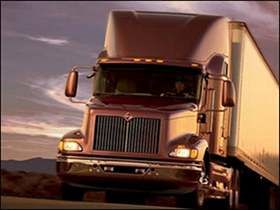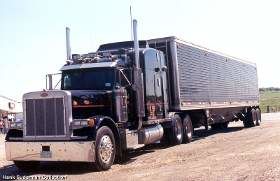Another Newb Question
Topic 6387 | Page 1
Dave, when you go pick up a trailer like that one of the first things you are going to do is get it to a certified scale at a nearby truck stop and weigh it so that you know you're various axle weights are within the proper limits. Once you've got some experience you will be able to tell from your paper work whether you actually need to double check it or not. The companies I have worked with will re-imburse you for the charges at the scale on the following pay check. Some of the shippers have scales on their property and will weigh you for free, but it's usually best to have that certified scale ticket from a Cat scale , because they will pay your ticket if their scale is wrong, or will go to court to defend you if it proves that their scale is right and the officer is wrong.
Shipper:
The customer who is shipping the freight. This is where the driver will pick up a load and then deliver it to the receiver or consignee.
CAT Scale:
A network of over 1,500 certified truck scales across the U.S. and Canada found primarily at truck stops. CAT scales are by far the most trustworthy scales out there.
In fact, CAT Scale offers an unconditional Guarantee:
“If you get an overweight fine from the state after our scale showed your legal, we will immediately check our scale. If our scale is wrong, we will reimburse you for the fine. If our scale is correct, a representative of CAT Scale Company will appear in court with the driver as a witness”
OWI:
Operating While Intoxicated

Are you given a grace period to get it scaled? Like say you run into a DOT checkpoint before you are able to make your way to a scale?
DOT:
Department Of Transportation
A department of the federal executive branch responsible for the national highways and for railroad and airline safety. It also manages Amtrak, the national railroad system, and the Coast Guard.
State and Federal DOT Officers are responsible for commercial vehicle enforcement. "The truck police" you could call them.
I don't know of any grace period, but I will say that most of the shippers are trying to load you legally. They pretty much know what they are doing, and most of them try and do a good job at it. You will learn to know the ones who might be pushing the limits occasionally, but for the most part the cheaters are few and far between.
Shipper:
The customer who is shipping the freight. This is where the driver will pick up a load and then deliver it to the receiver or consignee.

With full understanding that it is the drivers responsibility to be in compliance regarding rules and regulations, If you pick up a load from the shipper trailer is loaded and ready to go your job is to back up hook up and deliver it to its destination. halfway through the trip a weigh station says you are overweight. Why should the driver suffer? he did not load it he was just doing his job. I am sure this has been covered but i am new to the site and the industry so any insight and knowledge i can gain would be useful
The driver is responsible for his load regardless of who loaded it or what it is. Don't let someone else ruin your day.
Shipper:
The customer who is shipping the freight. This is where the driver will pick up a load and then deliver it to the receiver or consignee.
New Reply:
New! Check out our help videos for a better understanding of our forum features

















Preview:
This topic has the following tags:
Driver Responsibilities Understanding The Laws








 TT On Facebook
TT On Facebook
With full understanding that it is the drivers responsibility to be in compliance regarding rules and regulations, If you pick up a load from the shipper trailer is loaded and ready to go your job is to back up hook up and deliver it to its destination. halfway through the trip a weigh station says you are overweight. Why should the driver suffer? he did not load it he was just doing his job. I am sure this has been covered but i am new to the site and the industry so any insight and knowledge i can gain would be useful
Shipper:
The customer who is shipping the freight. This is where the driver will pick up a load and then deliver it to the receiver or consignee.